TODAY’S READING FROM THE OLD TESTAMENT- 1 KINGS 8:1-66
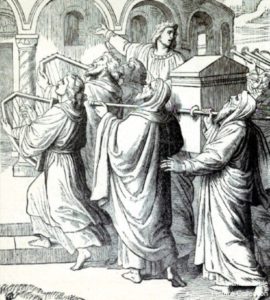 Up until now, the Ark of the Covenant has been in the Tent of Meeting, but now, during the Feast of Tabernacles, Solomon directs the priests to carry the Ark into the temple to be placed in the inner sanctuary.
Up until now, the Ark of the Covenant has been in the Tent of Meeting, but now, during the Feast of Tabernacles, Solomon directs the priests to carry the Ark into the temple to be placed in the inner sanctuary.
How fitting that the Ark be brought into the temple at the time when the Jews were commemorating God’s presence having traveled with them during their wilderness wanderings! The placement of the Ark in the Temple marks the end of its journey. The Ark of the Covenant serves as a placeholder for the person of Christ. The glory of God is ultimately beheld in Jesus Christ. “The Word is made flesh and tabernacled among us. We beheld His glory, the glory of the only begotten of the Father, full of grace and truth.” (John 1:14).
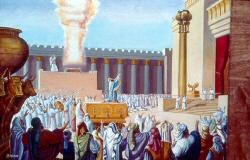 The glory cloud that fills the temple is most likely the same pillar of cloud that led the children of Israel through the wilderness. The cloud is a symbol of the presence of the Lord and the blessing bestowed on the basis of what is prescribed of righteousness according to His holy law.
The glory cloud that fills the temple is most likely the same pillar of cloud that led the children of Israel through the wilderness. The cloud is a symbol of the presence of the Lord and the blessing bestowed on the basis of what is prescribed of righteousness according to His holy law.
Notice that by this time in the history of the children of Israel, the Ark only contains the tables of stone (the ten commandments). Aaron’s rod and the pot of manna, reminders of their history of rebellion in the wilderness, were no longer there.
When the Ark was in place, the priests withdrew from the Holiest of all and the cloud of Shekinah glory filled the temple of the Lord.
Even as the tabernacle in the wilderness was a picture of the person and redemptive work of the Lord Jesus, so is the temple. Jesus referred to his body as being ‘this temple’ (John 2:19-22) and claimed it was a greater temple than Herod’s expanded temple of his day (Matthew 12:6).
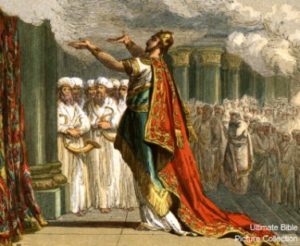 Solomon’s prayer is that God would hear all the prayers directed towards the temple and forgive those who sinned. The indispensability of prayers being directed towards the temple is a picture of the essential mediating role of our Lord Jesus. Apart from Who Jesus is and what He accomplished in the temple of His body, our sins separate us from God (Isaiah 59:2). Our prayers are directed to God through the temple of our mediator, Jesus Christ. They are requests made “in His Name.”
Solomon’s prayer is that God would hear all the prayers directed towards the temple and forgive those who sinned. The indispensability of prayers being directed towards the temple is a picture of the essential mediating role of our Lord Jesus. Apart from Who Jesus is and what He accomplished in the temple of His body, our sins separate us from God (Isaiah 59:2). Our prayers are directed to God through the temple of our mediator, Jesus Christ. They are requests made “in His Name.”
1 Timothy 2:5 5 For there is one God, and one mediator also between God and men, the man Christ Jesus,
The temple is referred to as ‘the house of the Lord’ 26 times in this passage.
Just as Moses was not able to stay in the tabernacle and minister when the glory of the Lord filled it (Exodus 40:33-35), neither could the priests when the Shekinah glory cloud filled the temple of Solomon (1 Kings 8:10).
1 Kings 8:10-11 10 It happened that when the priests came from the holy place, the cloud filled the house of the LORD, 11 so that the priests could not stand to minister because of the cloud, for the glory of the LORD filled the house of the LORD.
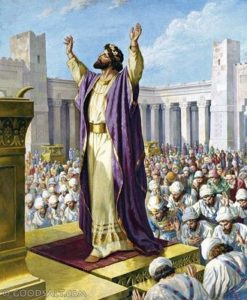 At the dedication of the temple, King Solomon turns around. He blesses the people, affirming the fact that God has proven Himself faithful to the promise he made to Solomon’s father, David (1 Kings 8:12-21).
At the dedication of the temple, King Solomon turns around. He blesses the people, affirming the fact that God has proven Himself faithful to the promise he made to Solomon’s father, David (1 Kings 8:12-21).
Then Solomon stands before the altar, spreads out his hands towards heaven, and prays. He asks that God fulfill His promise to David’s descendants, that they and future generations would be faithful and thereby be guaranteed a royal dynasty.
However, Solomon and his descendants fail to keep the covenant. God’s promise would find its fulfillment in Jesus of Nazareth many generations later. And His kingdom is being established forever.
The temple is dedicated as a place of testimony and a place of prayer (1 Kings 8:28-30).
Solomon also dedicates the temple as a place where God can execute judgment (1 Kings 8:31-32). It is a place for repentance, forgiveness, reconciliation, and restoration (1 Kings 8:33-34). It should be a place where God’s people recognize God’s righteous rule, His just requirements and humble themselves to receive correction, forgiveness, and instruction.
The temple is dedicated to be a place where God is God and revered as such, with no other competitors in view. It is a place where God’s name is glorified, and His testimony attracts the foreigner (v. 41-43). God’s intention was that all nations would be blessed by the testimony of His grace that would come through Israel. The nation would be a light to the Gentiles. Spiritual blindness and hardened hearts, through the deceitfulness of sin, sabotaged their mission to reach out to the rest of the world. Jesus, the promised seed of Abraham, the greater prophet whom Moses foretold, would succeed where Israel failed. He is the One who brings light to the Gentiles and the blessing of salvation to all nations.
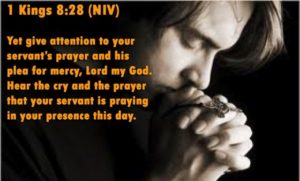 Solomon prays that the Lord would uphold the cause and fight the battles for His people (v. 44) and forgive the penitent of their sins (v. 45-51).
Solomon prays that the Lord would uphold the cause and fight the battles for His people (v. 44) and forgive the penitent of their sins (v. 45-51).
Solomon prays that God would continue to make Himself known as the God who answers prayer:
1 Kings 8:52-53 52 that Your eyes may be open to the supplication of Your servant and to the supplication of Your people Israel, to listen to them whenever they call to You. 53 “For You have separated them from all the peoples of the earth as Your inheritance, as You spoke through Moses Your servant, when You brought our fathers forth from Egypt, O Lord GOD.”
TODAY’S READING FROM THE NEW TESTAMENT – ACTS 7:51-8:13
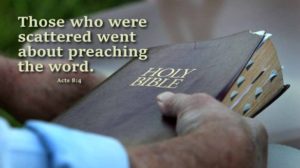 Stephen continues to speak before the High Priest and Council. He gives the history of the Jews with the ‘God of glory’ as the subject of almost every sentence.
Stephen continues to speak before the High Priest and Council. He gives the history of the Jews with the ‘God of glory’ as the subject of almost every sentence.
Before emphasizing what Stephen did not have in common with these apostate Jews, the belief that Jesus is the Son of God, he starts with what they do have in common. He starts with their history as descendants of Abraham and their participation in the covenant that God made with him as it had been sealed with the ritual of circumcision (Acts 7:8).
The climax of the message brings their entire history to the feet of Jesus.
Acts 7:52-53 52 “Which one of the prophets did your fathers not persecute? They killed those who had previously announced the coming of the Righteous One, whose betrayers and murderers you have now become; 53 you who received the law as ordained by angels, and yet did not keep it.”
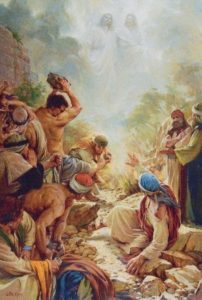 Today’s reading focuses on the people’s response.
Today’s reading focuses on the people’s response.
Acts 7:54-60 54 Now when they heard this, they were cut to the quick, and they began gnashing their teeth at him. 55 But being full of the Holy Spirit, he gazed intently into heaven and saw the glory of God, and Jesus standing at the right hand of God; 56 and he said, “Behold, I see the heavens opened up and the Son of Man standing at the right hand of God.” 57 But they cried out with a loud voice, and covered their ears and rushed at him with one impulse. 58 When they had driven him out of the city, they began stoning him; and the witnesses laid aside their robes at the feet of a young man named Saul. 59 They went on stoning Stephen as he called on the Lord and said, “Lord Jesus, receive my spirit!” 60 Then falling on his knees, he cried out with a loud voice, “Lord, do not hold this sin against them!” Having said this, he fell asleep.
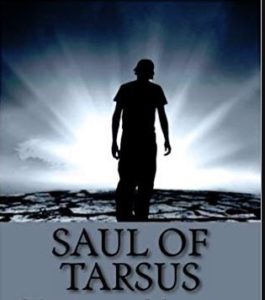 This episode is where we first meet Saul of Tarsus, who will become the great Apostle Paul. At this time, Saul is a member of the apostate religious crowd, thinking that they were doing God a favor by persecuting Christians (John 16:2). But Saul, who is consenting, if not ordering, the stoning of Stephen, is also hearing Stephen’s testimony, seeing his angelic countenance, and witnessing his words describing an open heaven with Jesus at the right of God and his powerful words of forgiveness and committal.
This episode is where we first meet Saul of Tarsus, who will become the great Apostle Paul. At this time, Saul is a member of the apostate religious crowd, thinking that they were doing God a favor by persecuting Christians (John 16:2). But Saul, who is consenting, if not ordering, the stoning of Stephen, is also hearing Stephen’s testimony, seeing his angelic countenance, and witnessing his words describing an open heaven with Jesus at the right of God and his powerful words of forgiveness and committal.
There is no chapter division in the original text. Chapter 8 picks up the resulting effects of Stephen being stoned.
Acts 8:1-4 1 Saul was in hearty agreement with putting him to death. And on that day a great persecution began against the church in Jerusalem, and they were all scattered throughout the regions of Judea and Samaria, except the apostles. 2 Some devout men buried Stephen, and made loud lamentation over him. 3 But Saul began ravaging the church, entering house after house, and dragging off men and women, he would put them in prison. 4 Therefore, those who had been scattered went about preaching the word.
Acts 8 informs us of the only person in the New Testament who is specifically called an ‘evangelist’- Philip.
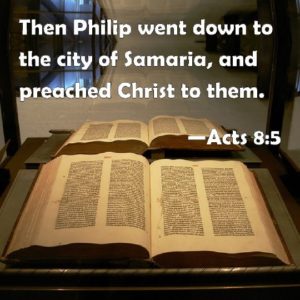 However, verse 4 tells us that everyone who had been scattered as a result of the persecution were ‘doing the work of evangelism’ (2 Timothy 4:5).
However, verse 4 tells us that everyone who had been scattered as a result of the persecution were ‘doing the work of evangelism’ (2 Timothy 4:5).
This passage tells us what an evangelist is.
An evangelist is someone who is:
- Proclaiming Christ (and the good news of what He has done).
- Proclaiming Christ to non-believers.
- Speaking so as to hold the attention of his listeners and drawing attention to the authenticity of the Biblical gospel message
- Directing converts to believe on the Lord Jesus, be baptized, and join themselves to a local church.
TODAY’S READING FROM THE BOOK OF PSALMS- PSALM 129:1-8
Psalm 129 describes the people of God who have suffered and continue to suffer.
Most scholars believe this to be written after the Jews return from their Babylonian exile and are surrounded by enemy nations.
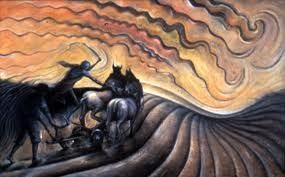 The destruction of Jerusalem by the Babylonians had been described by the prophets as a ‘plowing’, (Isaiah 51:23; Micah 3:12; Jeremiah 26:17-18). Therefore we can understand how the Psalmist was still feeling the sting of God’s chastisement in allowing Jerusalem to be destroyed by the Babylonians in in the past.
The destruction of Jerusalem by the Babylonians had been described by the prophets as a ‘plowing’, (Isaiah 51:23; Micah 3:12; Jeremiah 26:17-18). Therefore we can understand how the Psalmist was still feeling the sting of God’s chastisement in allowing Jerusalem to be destroyed by the Babylonians in in the past.
Psalm 129:3 3 “The plowers plowed upon my back; They lengthened their furrows.”
But we also can praise God for His faithfulness and His mercy in restoring them to the promised land.
 Psalm 129:4 4 The LORD is righteous; He has cut in two the cords of the wicked.
Psalm 129:4 4 The LORD is righteous; He has cut in two the cords of the wicked.
Persecution and trials are not to be considered a ‘strange thing’ (1 Peter 4:12) in the life of Israel or the life of the church. It is to be expected by those who are identified with the government of God.
Yet, the gates of hell will not prevail against the church that Christ is building (Matt 16:18; Psalm 129:2).
Psalm 129:2 2 “Many times they have persecuted me from my youth up; Yet they have not prevailed against me.
God will soundly defeat those who rise up against Him and His people.
The plowing of persecution and affliction work for us. It makes way for the implanting word to perform a work. In times of trial, we can put our faith in the precious promises of God’s Word, knowing that He will bring forth a harvest of righteousness, His likeness, and image perfected in us.
2 Corinthians 3:18 18 But we all, with unveiled face, beholding as in a mirror the glory of the Lord, are being transformed into the same image from glory to glory, just as from the Lord, the Spirit.
Grass on the housetop will not last long, as the soil is so shallow that it cannot take root. So the attacks of our enemies will not last. They, like seed sown on the wayside, will whither or be taken away.
Instead of returning evil for evil, we are to bless. Those who pass by may curse us, but the people of God can extend the mercy we have received and say to the world. “We bless you in the name of the Lord” (Psalm 129:8).
TODAY’S READING FROM THE BOOK OF PROVERBS- PROVERBS 17:1
Proverbs 17:1 1 Better is a dry morsel and quietness with it than a house full of feasting with strife.
Thank God for true peace and freedom from contention and strife. It is of greater worth than all the riches and luxuries money can buy.
PRAY FOR THE NATIONS- GUINEA- BISSAU
Guinea-Bissau
Africa
Geography
Area: 36,125 sq. km
Coastal state wedged between Senegal and Guinea, including the Bijagos archipelago.
The Republic of Guinea-Bissau has the sixth highest mortality rate in the world, and the average life expectancy is just under 50 years of age. This West African nation, located between Guinea and Senegal, is considered one of the poorest in the world. The legitimate economy of Guinea-Bissau relies heavily on farming and fishing. Illicit drug trafficking has grown almost unchecked, as the government has no coast guard, police do not have cars available, and the navy has no boats for patrolling the North Atlantic shores.
Guinea-Bissau gained independence from Portugal in 1974 and was ruled as an authoritarian dictatorship until 1994. Since then, military coups and assassinations have been common, and the only consistency among the nation’s leaders has been corruption. Many leaders are involved with drug trafficking, and some fear that this will prohibit the country from being transparent and stable. Guinea-Bissau is a nation of origin for child labor and sex trafficking. The majority of those trafficked are young boys whose families are falsely promised a Quranic education for their son, while in reality, they are transported to neighboring Senegal where they are beaten, abused, and forced to beg for money. Two hundred of these boys are estimated to be trafficked each month, roughly seven per day.
Under Portuguese rule, Guinea-Bissau was a predominantly Catholic nation. Since their independence, Islam has grown in prominence, and today roughly half the population claims to follow Mohammed. However, there is a high level of syncretism between Islam, Catholicism, and African traditional religions. There is freedom of religion in Guinea-Bissau unlike other nations in the region, and Christians have gained respect from their humanitarian work during civil unrest. There are an increasing number of missionaries to the nation from Latin America and Asia, however they tend to congregate in existing churches, leaving smaller people groups with a lack of spiritual guidance. There is a great need for Scripture in the nation, but low literacy rates and poverty make this difficult.
Population: 1,647,380 Annual Growth: 2.27%
Capital: Bissau
Urbanites: 30%
HDI Rank: 173 of 182 (UN Human Development Reports 2009)
Peoples
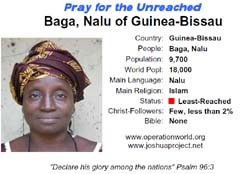 Peoples: 35 (43% unreached) All peoples
Peoples: 35 (43% unreached) All peoples
Unreached Peoples Prayer Card
Official language: Portuguese. National language Portuguese Creole, spoken by as much as half the population Languages: 25 All languages
Religion
Largest Religion: Muslim
|
Religion |
|
Pop % |
Ann Gr |
|
179,564 |
10.90 |
1.9 |
|
|
27,118 |
1.6 |
6.2 |
|
|
Muslim |
857,461 |
52.05 |
|
Challenges for Prayer
There is an increasing number of missionaries in the country, mostly Latin American and Asian, but notably fewer Westerners. The largest agencies are WEC, YWAM , and Kairos (Brazil). Many new groups are arriving, including some theologically marginal bodies. Some set up denominations near existing churches rather than going to needy and unreached areas. The majority do not stay long term, and many are sent by their supporting churches without real accountability or support. Pray for missionaries to cooperate across organizational lines and with the national Church; pray also that a greater emphasis might be given to working among the unevangelized.
The less-reached groups for whom prayer is needed:
a) The Muslim Fula/Fulbe and Mandinka. Both are large, dominant groups in many West African countries with a rich history and much influence. They are largely responsible for bringing Islam to Guinea-Bissau; may they instead become responsible for spreading the good news. The Fula are increasingly responsive to the gospel, and in a few locations, groups of believers are forming. The Mandinkas are more resistant but have some individual believers in the cities.
b) Smaller-population peoples of mixed Muslim and animist beliefs. The Biafada, Nalu, Masoanke, Jahanka, Jola-Fonyi, Soninke, Susu and Badyara have had very little, if any, work concentrated on them using their language and culture. Pray for ministry among them, and that fruit might be forthcoming.
c)Traditional-religion peoples are much more evangelized than the Muslim peoples. Praise God that there are Christians from almost all of these groups. These include the Balanta, Papel, Bijago, Manjaco, Mancanha, Jola-Felupe and Bayote. Pray also for the gospel to reach the other smaller, and often overlooked peoples.
PRAYER: Our glorious God and Father, we give You thanks for Your relentless pursuit of a bride for Your Son. Thank You for Your unfailing love and covenant commitment to travel with Your people through the many years of their wilderness journey. Thank You that the journey ends with us in the Holiest of All, in Christ Jesus, in Your presence. All that we need is found in Him. You have made Him to be the perfect solution for us, our righteousness, sanctification, and redemption. Truly we have been blessed with this gift of salvation. Make us a blessing to the nations by empowering us to declare and demonstrate the gospel to those from every tribe and tongue. In Jesus’ Name. Amen.

